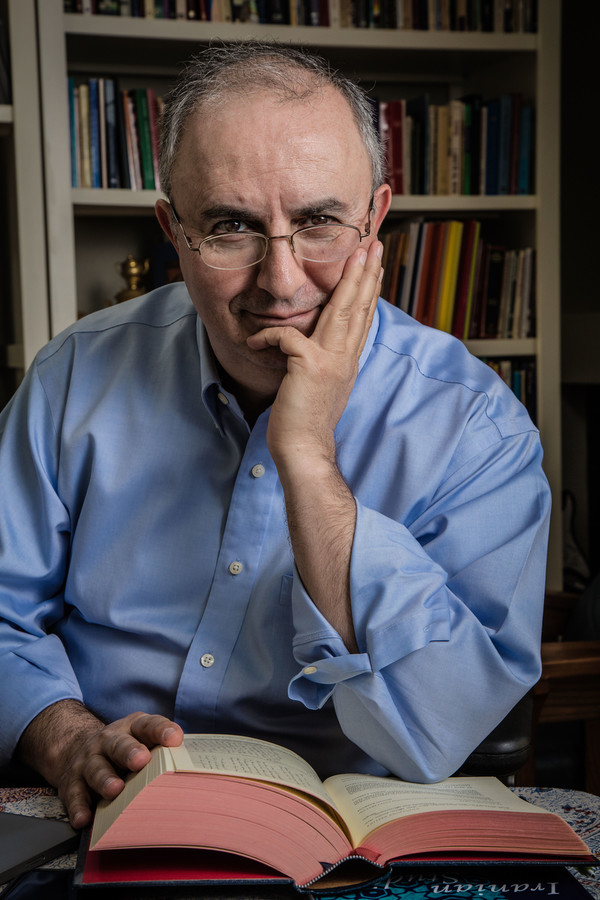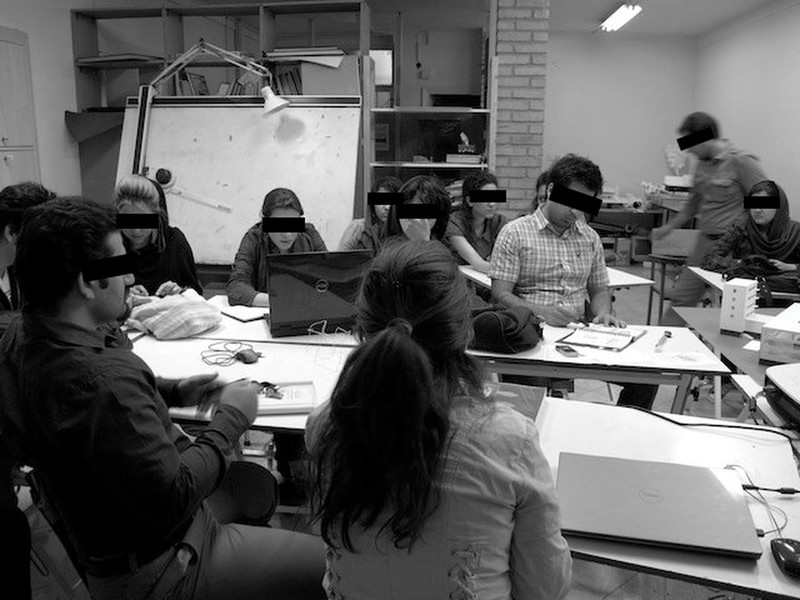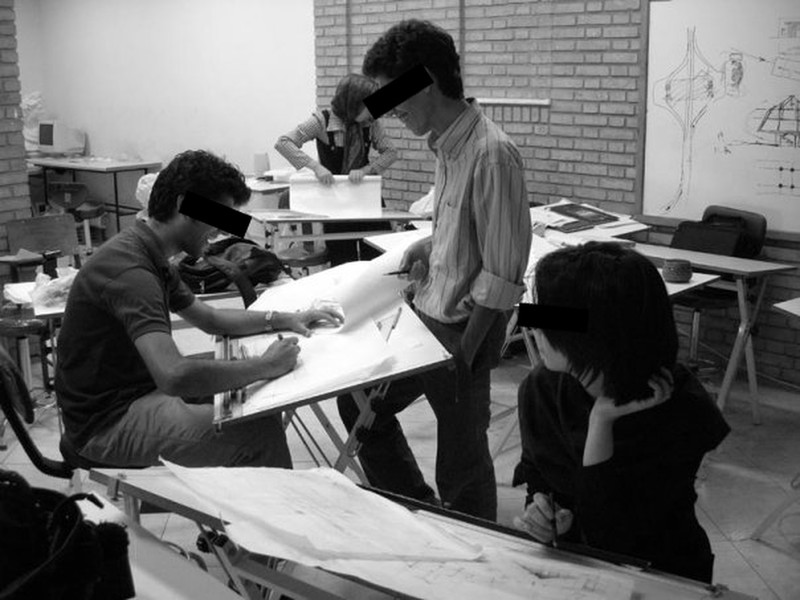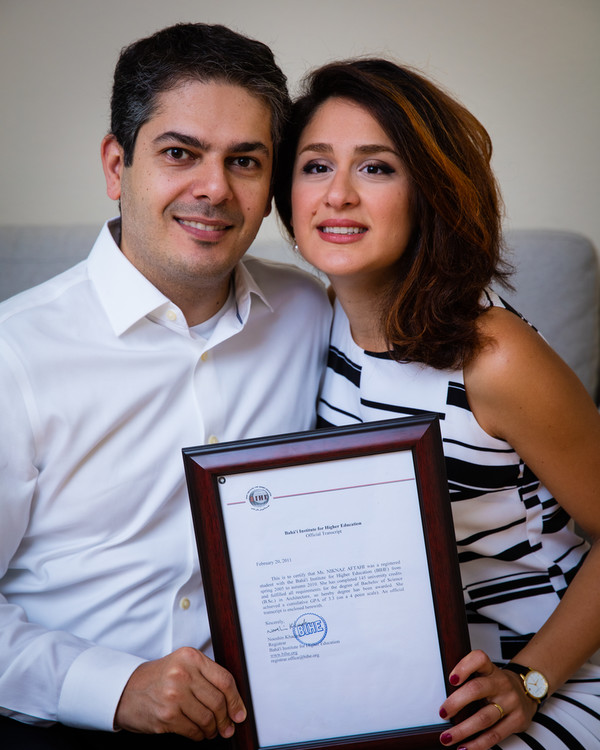Students of the Bahá’í faith are banned from education in Iran — but that doesn’t stop lecturer Farhad Sabetan from teaching them

On any given night, after he completes a full day of teaching at Cal State East Bay, College of Business and Economics lecturer Farhad Sabetan opens his computer, logs into an online classroom and begins his lessons all over again. His web students are eager, and depending on the course, they learn more or less the same principles as the students he sees face to face at CSUEB. But there’s a distinct difference: the online students are studying in secret, halfway around the world.
Sabetan has been teaching for the Bahá’í Institute for Higher Education in Iran for several years, volunteering his time to help students who, because of their faith, are banned from attending universities in Iran. Instead of filling lecture halls, the students at BIHE gather secretly in living rooms and basements or log in to secure chat rooms, knowing full well that if they are caught going to college, it could mean years of imprisonment.
Sabetan, a Bahá’í, left Iran in 1976 before the Islamic Revolution. Because of his involvement in the Bahá’í community and human rights activities, he has never returned. But his love of his faith and desire to help the next generation of Bahá’í learners permeate nearly every facet of his life.
“It’s not paid work, but the students are eager … I’ve met quite a few of them and they are amazing and driven,” he says. “They are really thirsty to be among their peers and engage in intellectual discourse.”
The university, while not recognized formally by the Iranian government, has 700 faculty members like Sabetan, many of whom were once teachers at government-run universities in Iran, but who lost their jobs due to their affiliation with the Bahá’í faith. The school currently offers more than 1,050 classes ranging from Persian literature to applied chemistry, and accepts 450 out of roughly 1,000 applicants each year.
“[BIHE] asks its instructors to apply the same conditions and standards as they apply to their own courses in the universities in which they teach,” Sabetan says. “It is important because BIHE strives to achieve the highest possible academic standard in the face of the limitations it has.”
UNDER FIRE
Followers of the the Bahá’í faith are the largest non-Muslim religious minority group in Iran. While Bahá’ís have been persecuted for the past 150 years, followers have been targeted more intensively since 1979 when Islam became the country’s national religion, and banned from everything from seeking an education to owning a business.
According to Anthony Vance, director of public affairs for the Bahá’ís of the United States, a memorandum published in 1991 promoted restrictions to be placed on the Bahá’í and was approved by Iran’s supreme leader. Though there is no formal published “law” against the Bahá’í — at least not in the way that is typical of Western governments — this action spurred the years of persecution since.
Documents issued after the 1991 memorandum outlined the various ways in which progress should be blocked for all Bahá’ís living in Iran, including denial of admission to universities and expulsion in the case of mistaken admittance.
Former BIHE student Niknaz Aftahi, 30, who now lives in Berkeley, remembers being kicked out of libraries because she was required to show an identification card that indicated she was Bahá’í. Sabetan says other Bahá’ís have been killed or threatened.
When Aftahi was studying at BIHE, where she was accepted at her own risk rather than opting not to go to college, the university had a small architecture studio. But students knew they were being watched and after a couple years, the learning space was shut down by the government.
“Sometimes there would be a man sitting outside on a chair pretending to read the newspaper, just like in the [spy] movies,” Aftahi says.
Similarly, Sabetan shares that interrupted or stalled communications while he’s teaching classes online is typical. One day, he recalls, an “11th student” showed up in his 10-person virtual class and he and his students figured it was a government official listening in.
It’s a reality that most CSUEB students couldn’t fathom, but Aftahi says for her and other BIHE students, living with the fear of being found studying became second nature.
THE PRICE OF LEARNING
When asked why students don’t just lie about their faith on the documents required to attend other colleges in Iran, Vance explains, “Honesty is a very important, basic spiritual trait in the Bahá’í faith, and therefore to lie about anything is inappropriate, but to lie about one’s fundamental belief [in] and relationship with God would be particularly inappropriate.”
Aftahi is one of about 50,000 students who have studied at BIHE since its inception in 1987.
“I knew it would be difficult [to hide my education], but the whole time you’re in [high] school, and you are planning for your university education … you’re thinking, ‘This is the last year of depriving Bahá’ís from entering university, and hopefully the educational discrimination is going to end, and I can enter university with all my high school friends,’” she says. “From an early age, you’re always thinking and wondering if the university door will open.”

“The risk is always there because the government knows about [BIHE] … at any moment if they wanted to arrest these students they could,” Sabetan says.
Instead of fearing that possibility, though, he says it drives them.
“I see that these students are so eager, they themselves are going out of their way to pursue an education. They’re sacrificing a lot to learn — it’s the very least I can [do] to teach them for an hour here or there. There’s often a mix of feelings — it’s sad and absolutely joyous at the same time.”
Government overreach also requires teachers like Sabetan to get creative with what and how they teach, and for students to play catch-up with major international events or ideas.
“At East Bay, I have to keep myself current with the literature, economic trends and latest findings and applications,” Sabetan said. “This is tremendously helpful to BIHE students who are hardly getting any unbiased news in Iran … of course as they learn of the latest developments, they need to catch up with a lot of background information, which is not easily accessible to them.”

But teachers are dedicated to making sure students are learning on par or above their peers at traditional universities both in Iran and beyond. Many have gone on to pursue graduate or doctoral degrees at universities worldwide. There are now 69 higher education institutions, including Yale, Boston University and UC Berkeley that count BIHE graduates among their students.
After Aftahi graduated from BIHE in 2010, she applied for graduate school in the United States. Initially, she was challenged in trying to explain why she graduated from a nontraditional university. However, she was accepted at UC Berkeley and started school in 2012, graduating with her master’s degree in 2014.
“Usually BIHE students struggle to introduce their school here,” Aftahi says. “You have to explain the whole story of religious persecution and that there are people that are banned from going to university because of their religion.”
Today, UC Berkeley and roughly 30 other schools in the U.S. now formally recognize BIHE as a legitimate undergraduate program, a move Aftahi says has allowed more Bahá’í students to continue their studies abroad.
UNCERTAIN FUTURE
Like Sabetan, Aftahi was involved with several human rights activities that prevent her from returning to Iran (or else risk arrest), but she is hopeful, nonetheless, of returning to teach there someday.
“I would love to go back in the long run, especially for teaching and practicing architecture in my own country. As much as I am happy and grateful for the opportunity that I have now to advance in my profession in the U.S. and contribute to my community, I would love to be able to go back to Iran, and contribute to the welfare and life of my country. “One-on-one communication with the students and having physical classes makes it much easier to communicate ideas in architecture, so hopefully if things change, I can go back in [the] near future,” Aftahi says.For now, she’s resolved to helping BIHE however she can. She currently teaches classes online alongside her husband, also a former BIHE student, in addition to her work at ELS Architecture & Design — a top-ranking architecture firm in the U.S.
She says the couple’s connection to the school and understanding of what students sacrifice to study are what inspire them to volunteer to teach.
“I think especially the experience that we went through, all the challenges that we’ve experienced, have allowed us to know how the students feel,” Aftahi says. “I know how frustrating it is to need a book, and being banned from it, even though what you’re doing is not wrong — in fact it’s good and positive.”

In the coming months, Sabetan is hoping to help the school beef up its graduate programs. The advanced programs are not as easy to start and support since graduate and doctoral students need access to more research materials, which is difficult to come by considering the ban on public libraries for Bahá’ís. Currently, BIHE offers graduate degrees in sociology, psychology, civil engineering and computer science.
Sabetan says he’s also interested in doing what he can to inform the world about the persecution of the Bahá’í, particularly surrounding education.
“Iran has one of the biggest brain drains in the world,” he explains. “Education is not a crime — I’m not saying it should be free, but at least it shouldn’t be illegal.
UNDERSTANDING BAHÁ’Í PERSECUTION: A BRIEF HISTORY
Founded by Bahá’ulláh in 19th-century Persia, the Bahá’í world community has more than 5 million followers and is established in 191 countries. It is a monotheistic religion emphasizing the spiritual unity of all humankind.
Teachings and doctrine are based on three core principles: the unity of God, the unity of religion and the unity of humanity. According to Bahá’í teachings, the human purpose is to know and love God through prayer, reflection and service. Other values include equality between men and women; independent investigation of truth; elimination of all forms of prejudice; and spiritual solutions to economic problems.
However, since 1991, when a memorandum was approved by Iran’s supreme leader outlining restrictions to be placed on Bahá’ís living in Iran, thousands have faced extreme persecution under the Islamic Republic. The memorandum and documents issued thereafter outlined the various ways progress of the Bahá’ís living in Iran should be blocked, including access to higher education.
“It’s really part of an overall plan to marginalize the Bahá’í community by impoverishing it and keeping it under-educated, which is the opposite of what was the case prior to the Islamic Revolution [in 1979],” says Anthony Vance, director of public affairs for the Bahá’ís of the United States.
According to the NGO Bahá’í International Community, more than 200 Bahá’ís have been killed and hundreds more have been imprisoned and tortured in the past 40 years. Tens of thousands have lost jobs, access to education and other rights. Government-led attacks on the Bahá’ís have intensified in the past decade, and according to the BIC, more than 7,000 pieces of anti-Bahá’í propaganda have been issued through Iran’s state-run media since 2013.
Source: www.bahai.org.
Leave a Reply